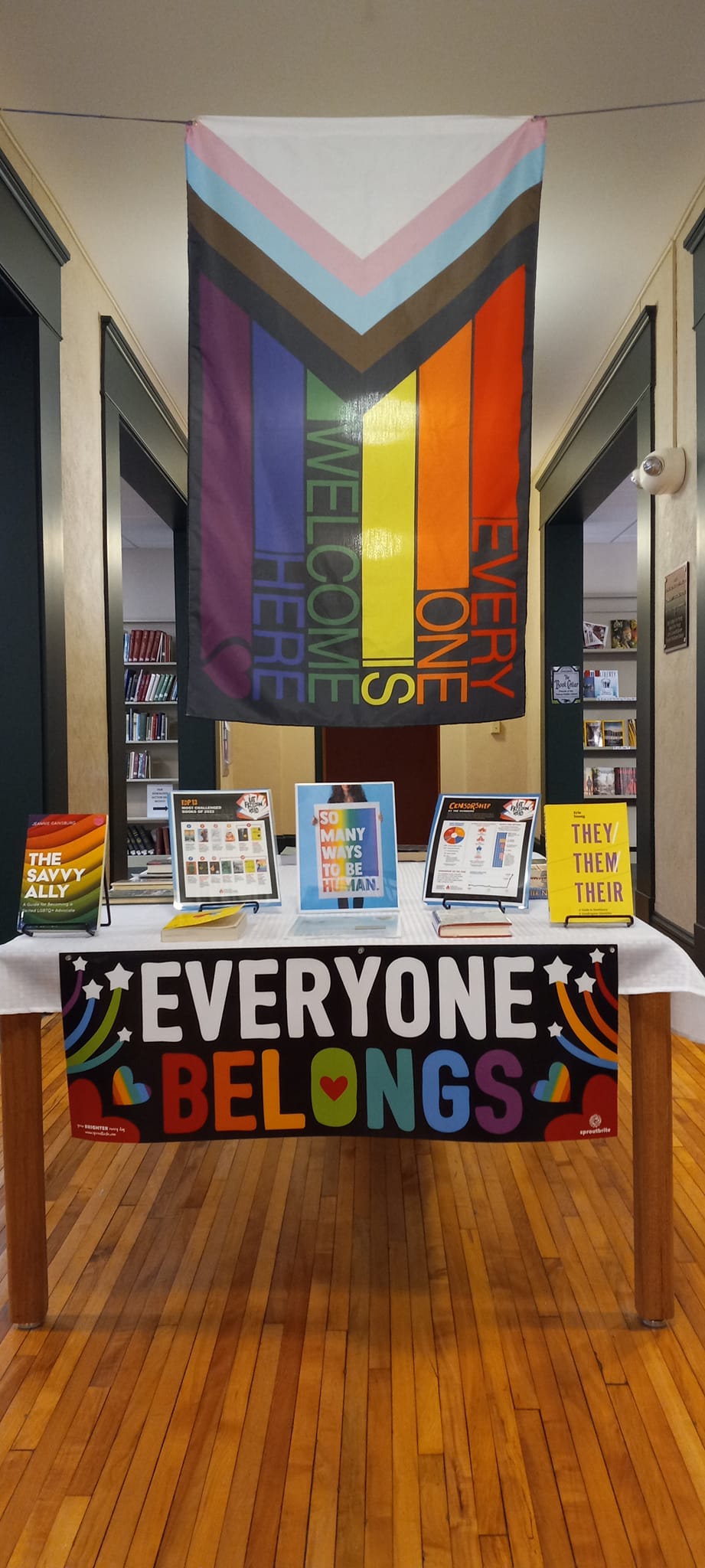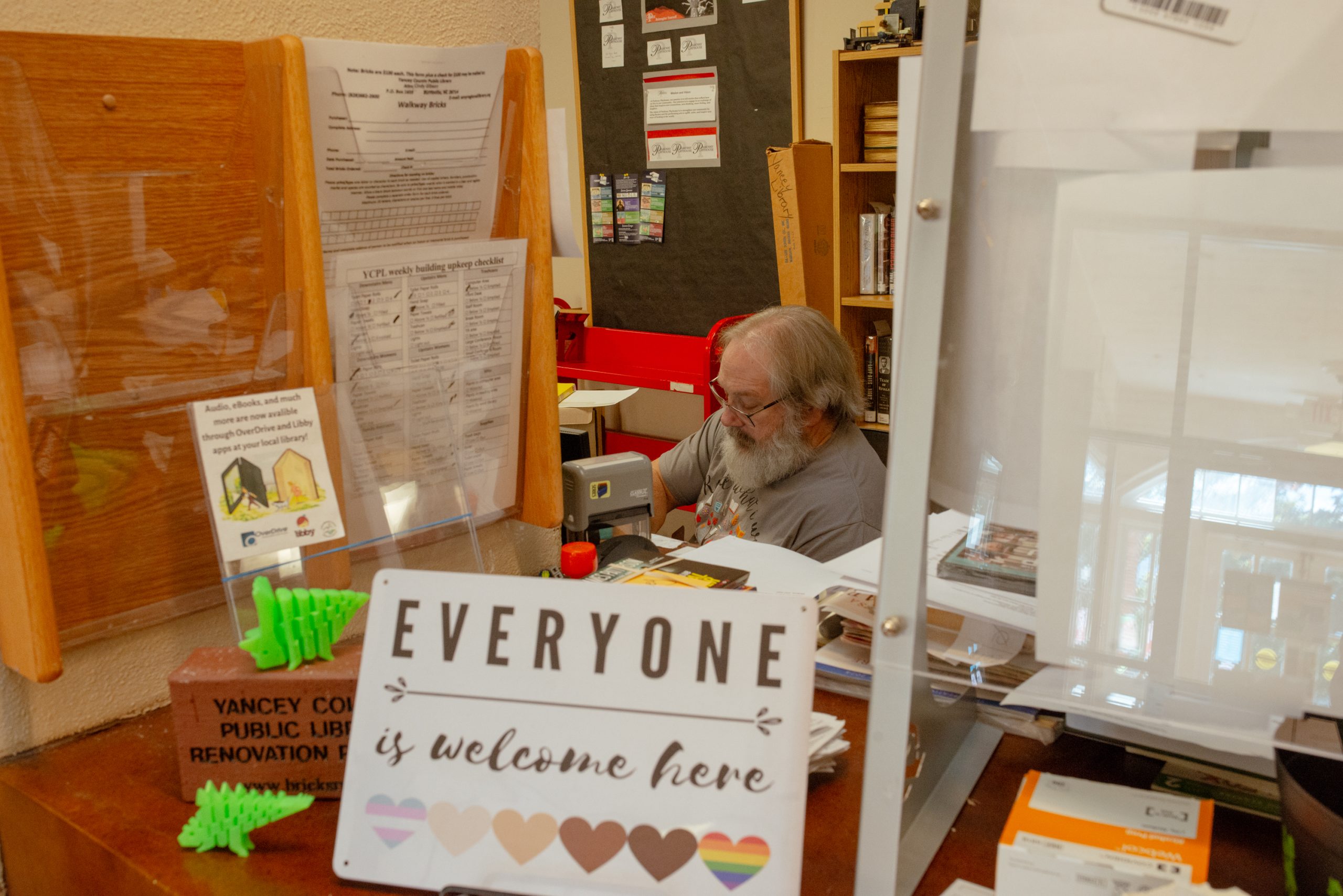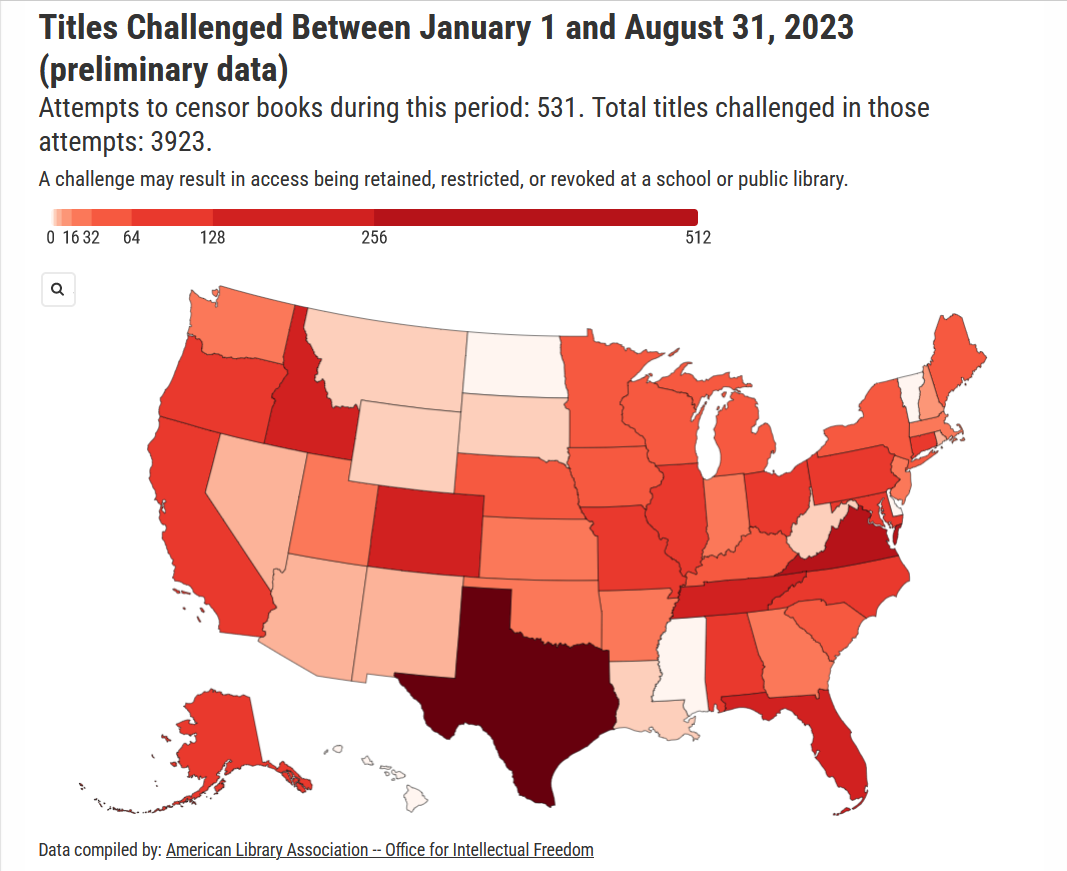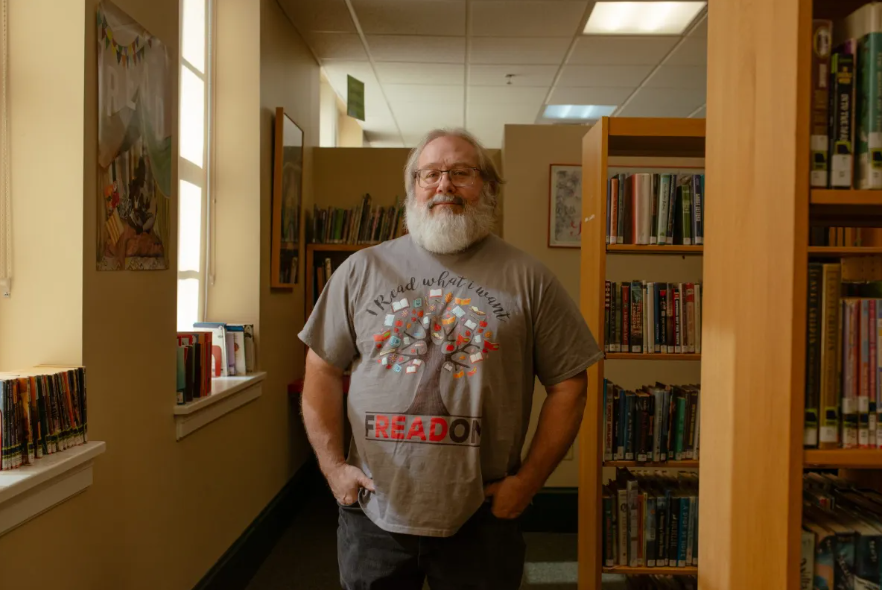Grace Vitaglione contributed to this report.
Just after 8 p.m. on May 31, Yancey County Public Library branch manager Wayne Edwards updated the cover photo of the Burnsville library’s Facebook page with a photograph of the branch’s new Pride display.
The Facebook post sparked a flurry of comments; of the more than 400 remarks, most were supportive of the Pride Month display.
But several people were concerned the display targeted children and promoted an “LGBTQ agenda,” a common refrain in the push for book bans throughout the country, and one that was reflected in the public scrutiny the Macon County Library faced for past pride displays and books with sexual and LGBTQ content.

Edwards, who has worked at the library for more than five years, said he wanted “everyone to feel included” by the display. He didn’t expect this reaction.
“I like to think that what we’re doing is trying to make sure that every child sees themselves here, in a storybook, or a coloring sheet or a display,” Edwards told CPP in a phone interview in October. “We’re trying to bring kids the world and bring them diversity and inclusion and acceptance.”
The Pride display became the center of controversy in the small Yancey County town in the mountains of WNC. Some people took their concerns to county commissioners. The display “indoctrinates” children into the LGBTQ agenda, one commenter wrote. But librarians and patrons such as Edwards argued the displays are there so LGBTQ people in the community “would feel seen and recognized.”
Yancey County commissioners considered such moves as seizing control of the library from the regional system to packing the library board with members opposed to the display.
The Macon County Public Library has also faced scrutiny over past pride displays and books with LGBTQ and sexual content. The community conflicts reflect a larger trend statewide of community members trying to remove or restrict access to certain books in public schools and libraries.
Response to the display in Yancey

After posting the photo of the Yancey County library’s pride display on Facebook, Edwards began receiving calls from a Facebook user named Sheila Poehler, a Yancey County resident, complaining about the display. Poehler commented more than 75 times on the library’s post. Poehler did not respond to CPP requests for comment.
In an email sent to library staff in early June and obtained by CPP, Poehler, echoing her comments on social media, wrote, “I have no issue with the Pride flag and banner on display, but I do have an issue with the adult LGBTQ books on the table … Parents of young children should not be put in the position of having to explain LGBTQ, etc to their kids.”
Later in the email, she wrote, “I have contacted the County Commissioner and hopefully this will be resolved.”
At the Yancey County Board of Commissioners monthly meeting a little more than a week later, board chair Jeff Whitson made a motion to explore leaving the Avery-Mitchell-Yancey Regional Library System and having the county run the library instead. Whitson did not respond to CPP’s requests for comment.
This would make it “an operation showing no bias to any religious, political or ethnic platform,” according to board meeting minutes.
Yancey County commissioners decided to keep the library in the system. But at their next meeting in August, commissioners appointed seven new members to the library board, including Poehler, and ignored appointment requests from the library’s board and regional director Amber Westall Briggs, according to the Asheville Citizen-Times.
As to whether commissioners were stacking the board with members opposed to the Pride Month display, Whitson told the Asheville Citizen-Times: “Just like any board that has control, whether it be Democrat or Republican, conservative or liberal, they’re going to put their people in there because they want to make sure that the policy that they think is right.”
Yancey County commissioners also appointed three new members directly to the regional board. According to Edwards, regional board members are normally chosen from sitting local board members with the regional board’s approval. They also appointed a county commissioner to the regional board, which is against library by-laws, according to a statement from Westall-Briggs.

Conflict in Macon County
The Macon County Public Library in Franklin, in WNC, is also facing controversy over its pride displays in 2021 and 2022.
Abby Hardison became a librarian at Macon County Public Library in December 2022, but said before she got there, “there had been a fair amount of controversy” over the pride displays. She said community members went to library meetings to protest books with sexual themes, arguing children should not be able to access some of them. In response, Macon County commissioners considered pulling out of the Fontana Regional Library System. This system includes libraries in Macon, Swain and Jackson counties in WNC. That would allow the county commissioners to manage the library instead of the FRL board.
Hardison said library staff still feel the weight of uncertainty over how to address calls for restricting access to books.
“It’s been incredibly stressful and demoralizing for library staff. I’ve commonly said that I long for the days in which people thought my job was very boring,” she said.
If the library had left the regional system, it would be a costly move, Fontana Regional Library System director Tracey Fitzmaurice said. “They would’ve been left with just the building, because everything inside it and all the employees are Fontana,” she said, which is according to the current agreement.
In April, commissioners relented after the library system agreed to revisit its regional agreement between the three counties. Changes to the agreement could include parents having greater control over what books children can check out, according to board meeting minutes. That review of the agreement also happened because it’s supposed to be revisited every decade, commissioners said.
A formal committee to change the agreement hasn’t been set up yet, according to Fitzmaurice. So, the regional agreement is still the same. However, Macon County commissioners passed proposed changes to the agreement on Nov. 14. Those proposed changes will be considered by the other two counties in the system and the regional system before they pass.
Fitzmaurice said the library’s displays and books on its shelves are there to represent all of its patrons.
“We have LGBT folks come into our library,” Fitzmaurice said. “And they have as much right to see themselves represented in books as anyone else. Representation is key. If you see that as a political thing, then that’s how you see it.”
A statewide and national trend
The Yancey County Public Library is hardly the only library or organization struggling with complaints from what Edwards called “a loud minority” of people fearful that books and displays with LGBTQ and/or sexual content could harm children and that books should be removed or access to them restricted.
Public libraries and schools across the country have been hard hit with complaints and challenges. PEN America reported that from July 2021 to June 2022, there were 2,532 instances of books being banned, affecting 1,648 unique book titles. The American Library Association found this trend surged in 2023; according to preliminary data, there were 695 attempts to censor library materials and services and documented challenges to 1,915 unique titles—a 20% increase from the previous year.

According to a study from UCLA’s Institute for Democracy, Education, and Access that surveyed more than 680 principals, political conflict is growing, especially among purple communities. The study found that in many schools, “parents or community members have sought to limit or challenge: Teaching about issues of race and racism (50%); Policies and practices related to LGBTQ+ student rights (48%); Student access to books in the school library (33%); or Social Emotional Learning (39%).”
“It’s a very organized, very orchestrated and very well-funded national movement. I just think that it’s just a coordinated effort to truly erase the LGBTQ population from notice,” Edwards said.
Several groups are fighting back against this movement nationally; the American Library Association, ACLU, Human Rights Campaign Foundation and NAACP are campaigning to keep many of these controversial books in public schools and libraries.
Liz Barber, director of policy and advocacy at the NC ACLU, wrote to CPP in a statement: “Libraries are an entry point to a whole universe of ideas. They are places where we are free to encounter and explore new ideas, topics, and viewpoints – and give children opportunities to learn to think for themselves. It is disappointing to see this freedom to read being challenged not only in North Carolina, but across the country. It is even more upsetting as it is a targeted attack on people of color and LGBTQ+ communities.”
In N.C., many school districts haven’t faced book challenges yet. Earlier this spring, WUNC and other news organizations reported that 189 books had been challenged across the state’s school districts over the past two years. But there’s concern among school districts of more backlash against books, NC Newsline reported.
Still, in December 2021, in Wake County, a group of mothers filed criminal complaints against the Wake County Public School System related to three books, “Gender Queer,” “Lawn Boy” and “George,” all of which feature LGBTQ themes, claiming they were obscene, according to a report by ABC 11. Later that month, “Gender Queer,” which is one of the most challenged books in the country, was pulled from libraries in the Wake County Public Library System, only to return to shelves the following month while the system’s book selection policy was revamped to restrict books deemed “pervasively vulgar.”

The battle in Wake County’s public schools continued. In June, Moms for Liberty, a conservative political organization, filed 189 challenges against 20 books it deemed inappropriate over the course of a single week, according to the News & Observer. But all the challenges were denied because they weren’t filed by parents of children who attended the schools.
On the N.C. coast, the New Hanover County School Board voted to remove the book “Stamped: Racism, Antiracism, and You” from the district’s classrooms after complaints from a parent of a former high school student who was assigned the book. The student received an alternative assignment after her parent raised the issue, but the parent argued it should be banned. The board’s decision allowed the book to remain in high school libraries, WHQR reported.
Unexpected results
The controversy has brought higher numbers of visitors than usual to the Yancey County library, according to Edwards. Some came to look at the controversial pride display for themselves, but it was gone once Pride Month ended.
The Yancey County Public Library has new displays each month, such as Black History Month and Women’s History Month, he said.
Despite the controversy, the library has received only one formal challenge to any of its books in the past nine years, according to a statement from Westall Briggs. Edwards said there’s a form on the library website to request reconsideration of material that’s open to anybody. Once someone fills the form out, it goes to the regional board to review the material and make a decision.
Those in support of book bans don’t respect or want to go through the democratic process, Edwards said.
“They want a government by mandate. They want people who think like them or believe like them to mandate what happens,” he said. “Why should I have to fill out a form and go through this whole process when I could just go to the top and say, ‘Hey, this needs to stop,’ and get it stopped?”

Edwards said he’s still fearful of the possibility that the commissioners would remove Yancey County Public Library from the regional system, thereby gutting most of its funding. The community conflict over the Pride displays lasted months and resulted in a major leadership change for the library, reflecting a wider pattern of controversies over access to LGBTQ books and books with sexual themes across the state.
_____
Have a question about this story? Do you see something we missed? Send an email to news@carolinapublicpress.org.
This article first appeared on Carolina Public Press and is republished here under a Creative Commons license.![]()






Before you comment
The comments section is here to provide a platform for civil dialogue on the issues we face together as a local community. Xpress is committed to offering this platform for all voices, but when the tone of the discussion gets nasty or strays off topic, we believe many people choose not to participate. Xpress editors are determined to moderate comments to ensure a constructive interchange is maintained. All comments judged not to be in keeping with the spirit of civil discourse will be removed and repeat violators will be banned. See here for our terms of service. Thank you for being part of this effort to promote respectful discussion.